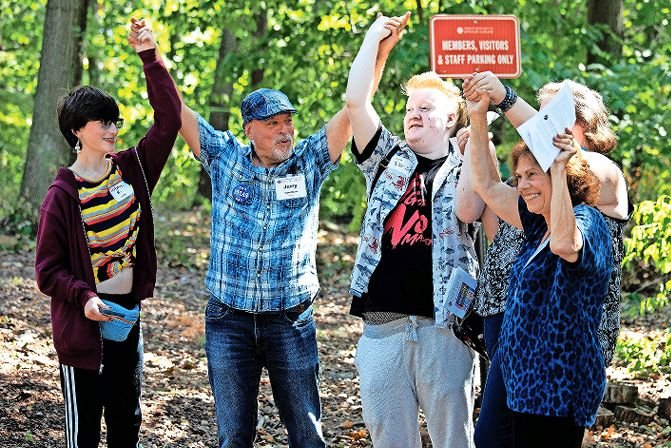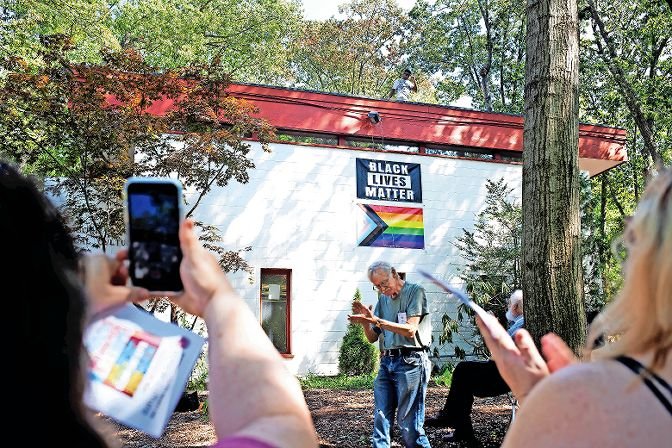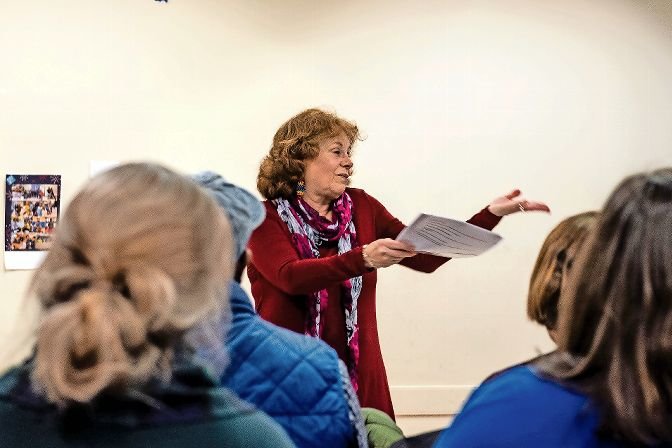Looking for just the right thing to say over the holidays
It’s not complicated, one social worker says: Treat people as people
We’ve all been there. Holiday dinner with the extended family, and one member you’re just not the most comfortable interacting with.
Not that you have any issue with that person. It’s just that you’re overcome with fear: Fear of saying the wrong thing.
That happens a lot, especially when it comes to the LGBTQ community. Jerry and Mimi Goodman know that first hand. More than two decades ago, their daughter came out to them. Not long after, their son said he, too, was gay.
Of course, their children were the same daughter and son they raised — but how would the conversations have to change?
They don’t, says Eva Dolgin. She is the youth pride initiative program director at CANDLE in New City — the Community Awareness Network for a Drug-free Life and Environment. While getting to know someone who is gay, lesbian, even queer or transgender may form a lot of questions that must be asked, it’s also important to remember that while sexuality and gender expression are important aspects of who people are, it’s not the only thing that defines them.
“What we need to do is honor where folks are and what they share with us,” said Dolgin, who uses the she/they pronouns. “Language is a tool that we use to describe who we are in our world.”
Dolgin joined a recent online discussion hosted by the Goodmans and their group, Bronx Parents of Pride. Created last year, Parents of Pride is exactly as its name sounds: A support and advocacy group for parents, family, friends and allies of those in the extended LGBTQ community.
While normal times would have had Dolgin visit the group’s home at the Riverdale-Yonkers Society for Ethical Culture meeting house in Fieldston, the coronavirus moved it into a Zoom discussion instead.
Then again, the internet has become a great place to help open doors within the community that might not have opened well in the past, Dolgin said. That’s especially true for those who identify as transgender and gender-queer.
It seems every day someone publicly joins that community — most recently “Umbrella Academy” actor Elliot Page.
For those new to seeing such a public face on this part of the community, questions certainly abound, Dolgin said. But knowing what to ask — and when, if ever — is important.
“I ask you a question, you answer it. You ask me a question, or we start reminiscing, right?” she said. “I want you to have questions, I want you to remain curious and open. That doesn’t necessarily mean I want you feeling like you can ask any question.”
People who are genuinely curious about someone, especially in the transgender community, might feel that asking questions is a way to express that curiosity and support, Dolgin said. Yet many times, those questions become overly personal and outright inappropriate.
“I want you to do the pause-and-reflect moment,” Dolgin said. “Do I ask this question? Is this a question based on something that comes into my mind that is going to be heard as supportive? Or is it going to be heard as intrusive?
“Is it going to be heard as ‘I love you’? Or is it going to be heard as I feel like I need so much more information to be able to show up for you?”
One way to think about whether a question is appropriate or not is if you would ask it of any other person, especially one who identifies as heterosexual. Would you be comfortable asking them questions about their anatomy, for example, or have them ask detailed questions about yours?
“I don’t mean stop asking questions entirely,” Dolgin said. “I just want you to be able to recognize the pause.”
The best questions? What’s going on right now? What are you proud of? Anything new? Have you read something fun?
“Like all the stuff we talk to everyone in our lives about, especially in pandemic land,” Dolgin said. “I have lots of conversations about how I ‘need a new show, do you have any suggestions for me?’
“Ask all the things that show someone you’re interested in who they are beyond their gender identity,” Dolgin added. “If all we ask about is somebody’s gender, that’s exhausting. That is one part of who any of us are. And folks want the rest of who they are to be honored and seen and cared about, too.”
And most important? If someone has asked you to call them by a particular name, or using specific pronouns: honor it, Dolgin said. Even if you’re not used to it. It’s the best way to show love and support, and keep the holidays joyous.











